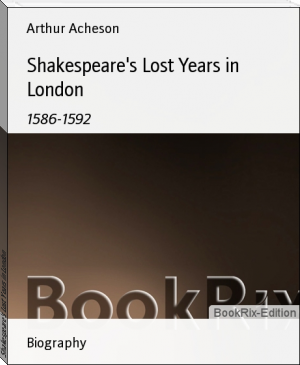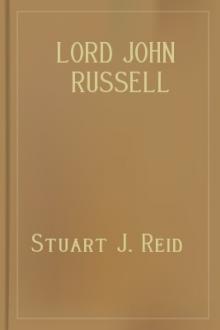Shakespeare's Lost Years in London, Arthur Acheson [bookreader .txt] 📗

- Author: Arthur Acheson
Book online «Shakespeare's Lost Years in London, Arthur Acheson [bookreader .txt] 📗». Author Arthur Acheson
TO MY SONS
ARTHUR MURRAY ACHESON
AND
ALEXANDER G. ACHESON
I DEDICATE THIS VOLUME
"The purpose of playing, whose end, both at the first and now, was, and is, to hold, as 'twere, the mirror up to nature; to show virtue her own feature, scorn her own image, and the very age and body of the time his form and pressure."
_Hamlet_, Act III. Scene ii.
CONTENTS
CHAP
I. INTRODUCTORY
II. THE STRATFORD DAYS, 1564-1586
III. SHAKESPEARE, THE BURBAGES, AND EDWARD ALLEYN, 1586-1591
IV. SHAKESPEARE AND THE EARL OF PEMBROKE'S COMPANY, 1591-1594
V. SHAKESPEARE AND THE SCHOLARS, 1588-1592
VI. THE POLITICAL PURPOSE OF _KING JOHN_, 1591-1592
VII. INCEPTION OF THE FRIENDSHIP BETWEEN SHAKESPEARE AND THE EARL OF SOUTHAMPTON, 1591-1594
VIII. JOHN FLORIO AS SIR JOHN FALSTAFF'S ORIGINAL
APPENDIX--
1. Dedication of Florio's _Second Fruites_, 1591
2. Address to the Reader from Florio's _Second Fruites_, 1591
3. Dedication of Florio's _Worlde of Wordes_, 1598
4. Address to the Reader from Florio's _Worlde of Wordes_, 1598
5. John Florio's Will, 1625
SHAKESPEARE'S LOST YEARS IN LONDON
1586-1592
CHAPTER I
INTRODUCTORY
The most interesting and important fifteen years in the records of English dramatic literature are undoubtedly those between 1588 and 1603, within which limit all of Shakespeare's poems and the majority of his plays were written; yet no exhaustive English history, intelligently co-ordinating the social, literary, and political life of this period, has ever been written.
Froude, the keynote of whose historical work is contained in his assertion that "the Reformation was the root and source of the expansive force which has spread the Anglo-Saxon race over the globe," recognising a logical and dramatic climax for his argument in the defeat of the Spanish Armada in 1588, ends his history in that year; while Gardiner, whose historical interest was as much absorbed by the Puritan Revolution as was Froude's by the Reformation, finds a fitting beginning for his subject in the accession of James I. in 1603. Thus an historical hiatus is left which has never been exhaustively examined. To the resulting lack of a clearly defined historical background for those years on the part of Shakespearean critics and compilers--who are not as a rule also students of original sources of history--may be imputed much of the haziness which still exists regarding Shakespeare's relations to, and the manner in which his work may have been influenced by, the literary, social, and political life of this period. The defeat of the Armada ended a long period of threatened danger for England, and the following fifteen years of Elizabeth's reign were passed in comparative security. The social life of London and the Court now took on, by comparison with the troubled past, an almost Augustan phase. During these years poetry and the drama flourished in England as they never did before, or since, in any such space of time. Within a few years of the beginning of this time Shakespeare became the principal writer for, and later on a sharer in, a company of players which, at about the same time, was chosen as the favourite Court company; a position which--under various titles--it continued to hold thereafterwards for over forty years.
When we compare the plays of Shakespeare with those of his contemporaries and immediate successors, it becomes evident that this dominant position was maintained by his company largely through the superior merit of his work while he lived, and by the prestige he had attained for it after he had passed away.
In the time of Elizabeth the stage was recognised as one of the principal vehicles for the reflection of opinion concerning matters of public interest; the players being, in Shakespeare's phrase, "the abstract and brief chronicles of the time." The fact that laws were passed and Orders in Council issued prohibiting the representation of matters of Church or State upon the stage, clearly implies the prevalence of such representations. It is altogether unlikely that the most popular dramatist of the day should, in this phase of his art, have remained an exception to the rule.
I hold it to have been impossible that such an ardent Englishman as Shakespeare, one also so deeply interested in human motive, character, and action, should have lived during these fifteen years in the heart of English literary and political life,--coming, through his professional interests, frequently and closely in contact with certain of its central figures,--and should during this interval have written twenty original plays, three long poems, and over one hundred and fifty sonnets, without leaving in this work decipherable reflections of the characters and movements of his time. That these conscious, or unconscious, reflections have not long ago been recognised and interpreted I impute to the lack of an intimate knowledge of contemporary history on the part of the majority of his critics and biographers.
Competent text critics, in their efforts to establish the chronological order of the dramas, have long since displayed the facts that Shakespeare's earlier original plays were largely comedies of a joyous nature, and that, as the years pass, his work becomes more serious and philosophical; in time developing into the pessimistic bitterness of _Lear_ and _Timon of Athens_, but softening and lightening, at the end of his career, in the gravely reflective but kindly mood of _Cymbeline_, _A Winter's Tale_, and _The Tempest_; yet no serious attempt has ever been made to trace and demonstrate in the personal contact of the writer with concurrent life the underlying spiritual causes of these very palpable changes in his expression of it. Until this is done no adequate life of Shakespeare can be written.[1]
Now, in order to be enabled to find in Shakespeare's personal observation and experience the well-springs of the plainly developing and deepening reflections of human life in action, so evident in his dramas when studied chronologically, a sound knowledge of contemporary social, literary, and political history is the first essential; possessing this, the serious student will soon realise in the likenesses between Shakespeare's dramatic expression, and his concurrent possibilities of observation and experience, that he portrayed life as he himself saw and felt it, and that he used the old and hackneyed stories and chronicles which he selected for his plots, not because he lacked the power of dramatic construction, but in order to hide the underlying purposes of his plays from the public censor. While no intelligent student needs any other warrant for this belief than the plays themselves, when chronologically co-ordinated with even an elementary knowledge of the history of the period, we have Shakespeare's own assertion that this was the actual method and spirit of his work. When he tells us in _Hamlet_ that "the purpose of playing, whose end, both at the first _and now_, was, _and is_, to hold, as 'twere, the mirror up to nature; to show virtue her own feature, scorn her own image, and _the very age and body of the time_ his form and pressure," he is not attempting to describe the dramatic methods of ancient Denmark, but is definitely expounding the functions of dramatic exposition as they prevailed in actual use in his own day, and as he himself had then exercised them for over ten years.
Any attempt to visualise Shakespeare in his contemporary environment, and spiritually to link his work year by year with the life of his time, would be impossible unless there can first be attained a far clearer idea than now exists of his theatrical connections, the inception of his dramatic work, and of the literary and social affiliations he formed and antagonisms he aroused, during his first six or eight years in London. The purpose of this book is--by casting new light upon this period of Shakespeare's career--to show the inception and development of conditions and influences which continued from that time forward materially to affect his and his friends' lives, and in turn to shape and colour the expression of life in action which he gives us in his works.
Though there is nothing known definitely concerning Shakespeare between 1587--when his name is mentioned in a legal document at Stratford regarding the transfer of property in which he held a contingent interest and which possibly infers his presence in Stratford at that date--and 1592, when Robert Greene alludes to him in his posthumously published _A Groatsworth of Wit_, it is usually assumed that he left Stratford in 1586 or 1587 with a company of players, or else that he joined a company in London at about that time.
As the Earl of Leicester's company is recorded as having visited Stratford-upon-Avon in 1587,--some time before 14th June,--and as James Burbage, the father of Richard Burbage, with whom we find Shakespeare closely affiliated in later years, was manager of the Earl of Leicester's company as late as 1575,--the year before he built the Theatre at Shoreditch,--it is generally assumed that he was still manager of this company in 1586-87, and that Shakespeare became connected with him by joining Leicester's company at this time. This assumption is, however, somewhat involved by another, nebulously held by some critics, _i.e._, that James Burbage severed his connection with Leicester's company in 1583, and joined the Queen's company, and that the latter company played under his management at the Theatre in Shoreditch for several years afterwards. It is further involved by the equally erroneous assumption that Burbage managed the Curtain along with the Theatre between 1585 and 1592.[2]
Certain biographical compilers also assert that Shakespeare, having joined the Earl of Leicester's company, continued to be connected with it under its supposed varying titles until the end of his London career, and that he was never associated with any other company. They assume that Leicester's company merged with Lord Strange's company of acrobats in 1589, the combination becoming known as Lord Strange's players; and that when this company left James Burbage and the Theatre, in 1592, for Philip Henslowe and the Rose Theatre, that Shakespeare accompanied them and worked for Henslowe both as a writer and an actor. They suppose that Edward Alleyn became the manager of a combination of the Admiral's company and Strange's men for a "short period," but that the companies "soon parted," "Strange's men continuing with Henslowe for a prolonged period."[3] It is





Comments (0)